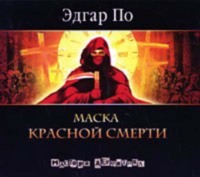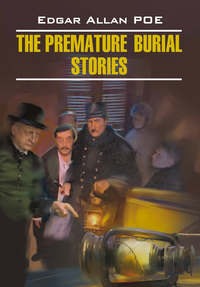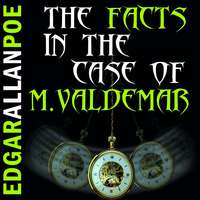 полная версия
полная версияThe Complete Stories of Edgar Allan Poe
Among all the retinue of the Baron, however, none were found to doubt the ardor of that extraordinary affection which existed on the part of the young nobleman for the fiery qualities of his horse; at least, none but an insignificant and misshapen little page, whose deformities were in every body’s way, and whose opinions were of the least possible importance. He (if his ideas are worth mentioning at all,) had the effrontery to assert that his master never vaulted into the saddle without an unaccountable and almost imperceptible shudder; and that, upon his return from every long-continued and habitual ride, an expression of triumphant malignity distorted every muscle in his countenance.
One tempestuous night, Metzengerstein, awaking from a heavy slumber, descended like a maniac from his chamber, and, mounting in hot haste, bounded away into the mazes of the forest. An occurrence so common attracted no particular attention, but his return was looked for with intense anxiety on the part of his domestics, when, after some hours’ absence, the stupendous and magnificent battlements of the Palace Metzengerstein, were discovered crackling and rocking to their very foundation, under the influence of a dense and livid mass of ungovernable fire.
As the flames, when first seen, had already made so terrible a progress that all efforts to save any portion of the building were evidently futile, the astonished neighborhood stood idly around in silent, if not apathetic wonder. But a new and fearful object soon riveted the attention of the multitude, and proved how much more intense is the excitement wrought in the feelings of a crowd by the contemplation of human agony, than that brought about by the most appalling spectacles of inanimate matter.
Up the long avenue of aged oaks which led from the forest to the main entrance of the Palace Metzengerstein, a steed, bearing an unbonneted and disordered rider, was seen leaping with an impetuosity which outstripped the very Demon of the Tempest.
The career of the horseman was indisputably, on his own part, uncontrollable. The agony of his countenance, the convulsive struggle of his frame, gave evidence of superhuman exertion: but no sound, save a solitary shriek, escaped from his lacerated lips, which were bitten through and through in the intensity of terror. One instant, and the clattering of hoofs resounded sharply and shrilly above the roaring of the flames and the shrieking of the winds – another, and, clearing at a single plunge the gateway and the moat, the steed bounded far up the tottering staircases of the palace, and, with its rider, disappeared amid the whirlwind of chaotic fire.
The fury of the tempest immediately died away, and a dead calm sullenly succeeded. A white flame still enveloped the building like a shroud, and, streaming far away into the quiet atmosphere, shot forth a glare of preternatural light; while a cloud of smoke settled heavily over the battlements in the distinct colossal figure of – a horse.
THE END
A Tale of Jerusalem (1831)
Intensos rigidam in frontem ascendere canos
Passus erat —
Lucan – De Catone.
– a bristly bore.
“Let us hurry to the walls,” said Abel-Phittim to Buzi-Ben-Levi and Simeon the Pharisee, on the tenth day of the month Thammuz, in the year of the world three thousand nine hundred and forty-one – “let us hasten to the ramparts adjoining the gate of Benjamin, which is in the city of David, and overlooking the camp of the uncircumcised; for it is the last hour of the fourth watch, being sunrise; and the idolaters, in fulfilment of the promise of Pompey, should be awaiting us with the lambs for the sacrifices.”
Simeon, Abel-Phittim, and Buzi-Ben-Levi, were the Gizbarim, or sub-collectors of the offering, in the holy city of Jerusalem.
“Verily,” replied the Pharisee, “let us hasten: for this generosity in the heathen is unwonted; and fickle-mindedness has ever been an attribute of the worshippers of Baal.”
“That they are fickle-minded and treacherous is as true as the Pentateuch,” said Buzi-Ben-Levi, “but that is only towards the people of Adonai. When was it ever known that the Ammonites proved wanting to their own interests? Methinks it is no great stretch of generosity to allow us lambs for the altar of the Lord, receiving in lieu thereof thirty silver shekels per head!”
“Thou forgettest, however, Ben-Levi,” replied Abel-Phittim, “that the Roman Pompey, who is now impiously besieging the city of the Most High, has no assurity that we apply not the lambs thus purchased for the altar, to the sustenance of the body, rather than of the spirit.”
“Now, by the five corners of my beard,” shouted the Pharisee, who belonged to the sect called The Dashers (that little knot of saints whose manner of dashing and lacerating the feet against the pavement was long a thorn and a reproach to less zealous devotees – a stumbling-block to less gifted perambulators) – “by the five corners of that beard which as a priest I am forbidden to shave! – have we lived to see the day when a blaspheming and idolatrous upstart of Rome shall accuse us of appropriating to the appetites of the flesh the most holy and consecrated elements? Have we lived to see the day when” —
“Let us not question the motives of the Philistine,” interrupted Abel-Phittim, “for to-day we profit for the first time by his avarice or by his generosity; but rather let us hurry to the ramparts, lest offerings should be wanting for that altar whose fire the rains of heaven cannot extinguish, and whose pillars of smoke no tempest can turn aside.”
That part of the city to which our worthy Gizbarin now hastened, and which bore the name of its architect King David, was esteemed the most strongly fortified district of Jerusalem; being situated upon the steep and lofty hill of Zion. Here a broad, deep, circumvallatory trench, hewn from the solid rock, was defended by a wall of great strength erected upon its inner edge. This wall was adorned, at regular interspaces, by square towers of white marble; the lowest sixty, and the highest one hundred and twenty cubits in height. But, in the vicinity of the gate of Benjamin, the wall arose by no means from the margin of the fosse. On the contrary, between the level of the ditch and the basement of the rampart, sprang up a perpendicular cliff of two hundred and fifty cubits; forming part of the precipitous Mount Moriah. So that when Simeon and his associates arrived on the summit of the tower called Adoni-Bezek – the loftiest of all the turrets around about Jerusalem, and the usual place of conference with the besieging army – they looked down upon the camp of the enemy from an eminence excelling by many feet, that of the Pyramid of Cheops, and, by several, that of the temple of Belus.
“Verily,” sighed the Pharisee, as he peered dizzly over the precipice, “the uncircumcised are as the sands by the sea-shore – as the locusts in the wilderness! The valley of The King hath become the valley of Adommin.”
“And yet,” added Ben-Levi, “thou canst not point me out a Philistine – no, not one – from Aleph to Tau – from the wilderness to the battlements – who seemeth any bigger than the letter Jod!”
“Lower away the basket with the shekels of silver!” here shouted a Roman soldier in a hoarse, rough voice, which appeared to issue from the regions of Pluto – “lower away the basket with the accursed coin which it has broken the jaw of a noble Roman to pronounce! Is it thus you evince your gratitude to our master Pompeius, who, in his condescension, has thought fit to listen to your idolatrous importunities? The god Phœbus, who is a true god, has been charioted for an hour – and were you not to be on the ramparts by sunrise? Ædepol! do you think that we, the conquerors of the world, have nothing better to do than stand waiting by the walls of every kennel, to traffic with the dogs of the earth? Lower away! I say – and see that your trumpery be bright in color, and just in weight!”
“El Elohim!” ejaculated the Pharisee, as the discordant tones of the centurion rattled up the crags of the precipice, and fainted away against the temple – “El Elohim! – who is the God Phœbus? – whom doth the blasphemer invoke? Thou, Buzi-Ben-Levi! who art read in the laws of the Gentiles, and hast sojourned among them who dabble with the Teraphim! – is it Nergal of whom the idolater speaketh? – or Ashimah? – or – Nibhaz? – or Tartak? – or Adramalech? – or Anamalech? – or Succoth-Benith? – or Dragon? – or Belial? – or Baal-Perith? – or Baal-Peor? – or Baal-Zebub?”
“Verily it is neither – but beware how thou lettest the rope slip too rapidly through thy fingers; for should the wicker-work chance to hang on the projection of yonder crag, there will be a woful outpouring of the holy things of the sanctuary.”
By the assistance of some rudely constructed machinery, the heavily laden basket was now carefully lowered down among the multitude; and, from the giddy pinnacle, the Romans were seen gathering confusedly round it; but owing to the vast height and the prevalence of a fog, no distinct view of their operations could be obtained.
Half an hour had already elapsed.
“We shall be too late,” sighed the Pharisee, as at the expiration of this period, he looked over into the abyss – “we shall be too late! we shall be turned out of office by the Katholim.”
“No more,” responded Abel-Phittim, – “no more shall we feast upon the fat of the land – no longer shall our beards be odorous with frankincense – our loins girded up with fine linen from the Temple.”
“Raca!” swore Ben-Levi, “Raca! do they mean to defraud us of the purchase money? or, Holy Moses! are they weighing the shekels of the tabernacle?”
“They have given the signal at last,” cried the Pharisee, “they have given the signal at last! – pull away, Abel-Phittim! – and thou, Buzi-Ben-Levi, pull away! – for verily the Philistines have either still hold upon the basket, or the Lord hath softened their hearts to place therein a beast of good weight!” And the Gizbarim pulled away, while their burthen swung heavily upwards through the still increasing mist.
“Booshoh he!” – as, at the conclusion of an hour, some object at the extremity of the rope became indistinctly visible – “Booshoh he!” was the exclamation which burst from the lips of Ben-Levi.
“Booshoh he! – for shame! – it is a ram from the thickets of Engedi, and as rugged as the valley of Jehosaphat!”
“It is a firstling of the flock,” said Abel-Phittim, “I know him by the bleating of his lips, and the innocent folding of his limbs. His eyes are more beautiful than the jewels of the Pectoral, and his flesh is like the honey of Hebron.”
“It is a fatted calf from the pastures of Bashan,” said the Pharisee, “the heathen have dealt wonderfully with us! – let us raise up our voices in a psalm! – let us give thanks on the shawm and on the psaltery – on the harp and on the huggab – on the cythern and on the sackbut!”
It was not until the basket had arrived within a few feet of the Gizbarium, that a low grunt betrayed to their perception a hog of no common size.
“Now El Emanu!” slowly, and with upturned eyes ejaculated the trio, as, letting go their hold, the emancipated porker tumbled headlong among the Philistines, “El Emanu! – God be with us – it is the unutterable flesh! “
THE END
The Assignation (1834)
Stay for me there! I will not failTo meet thee in that hollow vale.[Exequy on the death of his wife, by Henry Кing. Bishop of Chichester.]
Ill-fated and mysterious man! – bewildered in the brilliancy of thine own imagination, and fallen in the flames of thine own youth! Again in fancy I behold thee! Once more thy form hath risen before me! – not – oh not as thou art – in the cold valley and shadow – but as thou shouldst be – squandering away a life of magnificent meditation in that city of dim visions, thine own Venice – which is a star-beloved Elysium of the sea, and the wide windows of whose Palladian palaces look down with a deep and bitter meaning upon the secrets of her silent waters. Yes! I repeat it – as thou shouldst be. There are surely other worlds than this – other thoughts than the thoughts of the multitude – other speculations than the speculations of the sophist. Who then shall call thy conduct into question? who blame thee for thy visionary hours, or denounce those occupations as a wasting away of life, which were but the overflowings of thine everlasting energies?
It was at Venice, beneath the covered archway there called the Ponte di Sospiri, that I met for the third or fourth time the person of whom I speak. It is with a confused recollection that I bring to mind the circumstances of that meeting. Yet I remember – ah! how should I forget? – the deep midnight, the Bridge of Sighs, the beauty of woman, and the Genius of Romance that stalked up and down the narrow canal.
It was a night of unusual gloom. The great clock of the Piazza had sounded the fifth hour of the Italian evening. The square of the Campanile lay silent and deserted, and the lights in the old Ducal Palace were dying fast away. I was returning home from the Piazetta, by way of the Grand Canal. But as my gondola arrived opposite the mouth of the canal San Marco, a female voice from its recesses broke suddenly upon the night, in one wild, hysterical, and long continued shriek. Startled at the sound, I sprang upon my feet: while the gondolier, letting slip his single oar, lost it in the pitchy darkness beyond a chance of recovery, and we were consequently left to the guidance of the current which here sets from the greater into the smaller channel. Like some huge and sable-feathered condor, we were slowly drifting down towards the Bridge of Sighs, when a thousand flambeaux flashing from the windows, and down the staircases of the Ducal Palace, turned all at once that deep gloom into a livid and preternatural day.
A child, slipping from the arms of its own mother, had fallen from an upper window of the lofty structure into the deep and dim canal. The quiet waters had closed placidly over their victim; and, although my own gondola was the only one in sight, many a stout swimmer, already in the stream, was seeking in vain upon the surface, the treasure which was to be found, alas! only within the abyss. Upon the broad black marble flagstones at the entrance of the palace, and a few steps above the water, stood a figure which none who then saw can have ever since forgotten. It was the Marchesa Aphrodite – the adoration of all Venice – the gayest of the gay – the most lovely where all were beautiful – but still the young wife of the old and intriguing Mentoni, and the mother of that fair child, her first and only one, who now deep beneath the murky water, was thinking in bitterness of heart upon her sweet caresses, and exhausting its little life in struggles to call upon her name.
She stood alone. Her small, bare, and silvery feet gleamed in the black mirror of marble beneath her. Her hair, not as yet more than half loosened for the night from its ball-room array, clustered, amid a shower of diamonds, round and round her classical head, in curls like those of the young hyacinth. A snowy-white and gauze-like drapery seemed to be nearly the sole covering to her delicate form; but the midsummer and midnight air was hot, sullen, and still, and no motion in the statue-like form itself, stirred even the folds of that raiment of very vapor which hung around it as the heavy marble hangs around the Niobe. Yet – strange to say! – her large lustrous eyes were not turned downwards upon that grave wherein her brightest hope lay buried – but riveted in a widely different direction! The prison of the Old Republic is, I think, the stateliest building in all Venice – but how could that lady gaze so fixedly upon it, when beneath her lay stifling her own child? Yon dark, gloomy niche, too, yawns right opposite her chamber window – what, then, could there be in its shadows – in its architecture – in its ivy-wreathed and solemn cornices – that the Marchesa di Mentoni had not wondered at a thousand times before? Nonsense! – Who does not remember that, at such a time as this, the eye, like a shattered mirror, multiplies the images of its sorrow, and sees in innumerable far off places, the wo which is close at hand?
Many steps above the Marchesa, and within the arch of the water-gate, stood, in full dress, the Satyr-like figure of Mentoni himself. He was occasionally occupied in thrumming a guitar, and seemed ennuyé to the very death, as at intervals he gave directions for the recovery of his child. Stupified and aghast, I had myself no power to move from the upright position I had assumed upon first hearing the shriek, and must have presented to the eyes of the agitated group a spectral and ominous appearance, as with pale countenance and rigid limbs, I floated down among them in that funereal gondola.
All efforts proved in vain. Many of the most energetic in the search were relaxing their exertions, and yielding to a gloomy sorrow. There seemed but little hope for the child; (how much less than for the mother!) but now, from the interior of that dark niche which has been already mentioned as forming a part of the Old Republican prison, and as fronting the lattice of the Marchesa, a figure muffled in a cloak, stepped out within reach of the light, and, pausing a moment upon the verge of the giddy descent, plunged headlong into the canal. As, in an instant afterwards, he stood with the still living and breathing child within his grasp, upon the marble flagstones by the side of the Marchesa, his cloak, heavy with the drenching water, became unfastened, and, falling in folds about his feet, discovered to the wonder-stricken spectators the graceful person of a very young man, with the sound of whose name the greater part of Europe was then ringing.
No word spoke the deliverer. But the Marchesa! She will now receive her child – she will press it to her heart – she will cling to its little form, and smother it with her caresses. Alas! another’s arms have taken it from the stranger – another’s arms have taken it away, and borne it afar off, unnoticed, into the palace! And the Marchesa! Her lip – her beautiful lip trembles: tears are gathering in her eyes – those eyes which, like Pliny’s acanthus, are “soft and almost liquid.” Yes! tears are gathering in those eyes – and see! the entire woman thrills throughout the soul, and the statue has started into life! The pallor of the marble countenance, the swelling of the marble bosom, the very purity of the marble feet, we behold suddenly flushed over with a tide of ungovernable crimson; and a slight shudder quivers about her delicate frame, as a gentle air at Napoli about the rich silver lilies in the grass.
Why should that lady blush! To this demand there is no answer – except that, having left, in the eager haste and terror of a mother’s heart, the privacy of her own boudoir, she has neglected to enthral her tiny feet in their slippers, and utterly forgotten to throw over her Venetian shoulders that drapery which is their due. What other possible reason could there have been for her so blushing? – for the glance of those wild appealing eyes? – for the unusual tumult of that throbbing bosom? – for the convulsive pressure of that trembling hand? – that hand which fell, as Mentoni turned into the palace, accidentally, upon the hand of the stranger. What reason could there have been for the low – the singularly low tone of those unmeaning words which the lady uttered hurriedly in bidding him adieu? “Thou hast conquered” – she said, or the murmurs of the water deceived me – “thou hast conquered – one hour after sunrise – we shall meet – so let it be!”
The tumult had subsided, the lights had died away within the palace, and the stranger, whom I now recognised, stood alone upon the flags. He shook with inconceivable agitation, and his eye glanced around in search of a gondola. I could not do less than offer him the service of my own; and he accepted the civility. Having obtained an oar at the water-gate, we proceeded together to his residence, while he rapidly recovered his self-possession, and spoke of our former slight acquaintance in terms of great apparent cordiality.
There are some subjects upon which I take pleasure in being minute. The person of the stranger – let me call him by this title, who to all the world was still a stranger – the person of the stranger is one of these subjects. In height he might have been below rather than above the medium size: although there were moments of intense passion when his frame actually expanded and belied the assertion. The light, almost slender symmetry of his figure, promised more of that ready activity which he evinced at the Bridge of Sighs, than of that Herculean strength which he has been known to wield without an effort, upon occasions of more dangerous emergency. With the mouth and chin of a deity – singular, wild, full, liquid eyes, whose shadows varied from pure hazel to intense and brilliant jet – and a profusion of curling, black hair, from which a forehead of unusual breadth gleamed forth at intervals all light and ivory – his were features than which I have seen none more classically regular, except, perhaps, the marble ones of the Emperor Commodus. Yet his countenance was, nevertheless, one of those which all men have seen at some period of their lives, and have never afterwards seen again. It had no peculiar – it had no settled predominant expression to be fastened upon the memory; a countenance seen and instantly forgotten – but forgotten with a vague and never-ceasing desire of recalling it to mind. Not that the spirit of each rapid passion failed, at any time, to throw its own distinct image upon the mirror of that face – but that the mirror, mirror-like, retained no vestige of the passion, when the passion had departed.
Upon leaving him on the night of our adventure, he solicited me, in what I thought an urgent manner, to call upon him very early the next morning. Shortly after sunrise, I found myself accordingly at his Palazzo, one of those huge structures of gloomy, yet fantastic pomp, which tower above the waters of the Grand Canal in the vicinity of the Rialto. I was shown up a broad winding staircase of mosaics, into an apartment whose unparalleled splendor burst through the opening door with an actual glare, making me blind and dizzy with luxuriousness.
I knew my acquaintance to be wealthy. Report had spoken of his possessions in terms which I had even ventured to call terms of ridiculous exaggeration. But as I gazed about me, I could not bring myself to believe that the wealth of any subject in Europe could have supplied the princely magnificence which burned and blazed around.
Although, as I say, the sun had arisen, yet the room was still brilliantly lighted up. I judged from this circumstance, as well as from an air of exhaustion in the countenance of my friend, that he had not retired to bed during the whole of the preceding night. In the architecture and embellishments of the chamber, the evident design had been to dazzle and astound. Little attention had been paid to the decora of what is technically called keeping, or to the proprieties of nationality. The eye wandered from object to object, and rested upon none – neither the grotesques of the Greek painters, nor the sculptures of the best Italian days, nor the huge carvings of untutored Egypt. Rich draperies in every part of the room trembled to the vibration of low, melancholy music, whose origin was not to be discovered. The senses were oppressed by mingled and conflicting perfumes, reeking up from strange convolute censers, together with multitudinous flaring and flickering tongues of emerald and violet fire. The rays of the newly risen sun poured in upon the whole, through windows formed each of a single pane of crimson-tinted glass. Glancing to and fro, in a thousand reflections, from curtains which rolled from their cornices like cataracts of molten silver, the beams of natural glory mingled at length fitfully with the artificial light, and lay weltering in subdued masses upon a carpet of rich, liquid-looking cloth of Chili gold.
“Ha! ha! ha! – ha! ha! ha!” – laughed the proprietor, motioning me to a seat as I entered the room, and throwing himself back at full length upon an ottoman. “I see,” said he, perceiving that I could not immediately reconcile myself to the bienséance of so singular a welcome – “I see you are astonished at my apartment – at my statues – my pictures – my originality of conception in architecture and upholstery – absolutely drunk, eh? with my magnificence. But pardon me, my dear sir, (here his tone of voice dropped to the very spirit of cordiality,) pardon me for my uncharitable laughter. You appeared so utterly astonished. Besides, some things are so completely ludicrous that a man must laugh or die. To die laughing must be the most glorious of all glorious deaths! Sir Thomas More – a very fine man was Sir Thomas More – Sir Thomas More died laughing, you remember. Also in the Absurdities of Ravisius Textor, there is a long list of characters who came to the same magnificent end. Do you know, however,” continued he musingly, “that at Sparta (which is now Palæochori), at Sparta, I say, to the west of the citadel, among a chaos of scarcely visible ruins, is a kind of socle upon which are still legible the letters ΛΑΣΜ. They are undoubtedly part of ΓΕΛΑΣΜΑ. Now at Sparta were a thousand temples and shrines to a thousand different divinities. How exceedingly strange that the altar of Laughter should have survived all the others! But in the present instance,” he resumed, with a singular alteration of voice and manner, “I have no right to be merry at your expense. You might well have been amazed. Europe cannot produce anything so fine as this, my little regal cabinet. My other apartments are by no means of the same order; mere ultras of fashionable insipidity. This is better than fashion – is it not? Yet this has but to be seen to become the rage – that is, with those who could afford it at the cost of their entire patrimony. I have guarded, however, against any such profanation. With one exception you are the only human being besides myself and my valet, who has been admitted within the mysteries of these imperial precincts, since they have been bedizzened as you see!”









